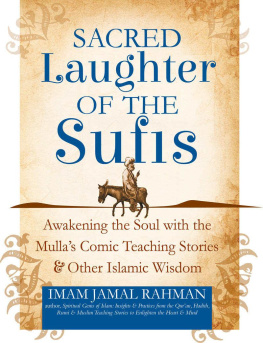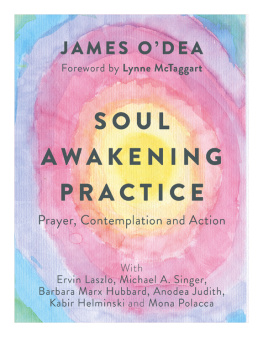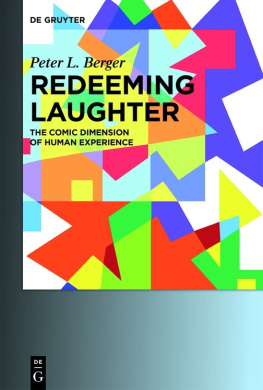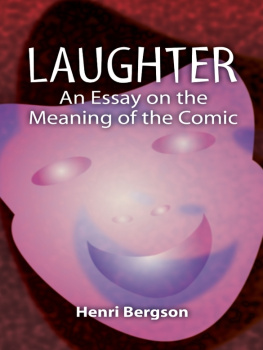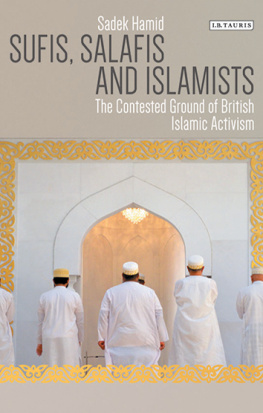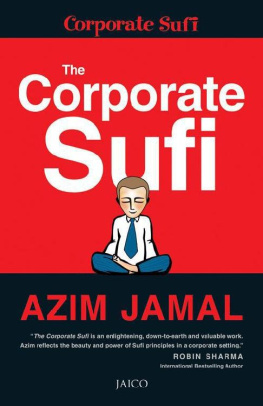Imam Jamal Rahman - Sacred Laughter of the Sufis: Awakening the Soul with the Mullas Comic Teaching Stories and Other Islamic Wisdom
Here you can read online Imam Jamal Rahman - Sacred Laughter of the Sufis: Awakening the Soul with the Mullas Comic Teaching Stories and Other Islamic Wisdom full text of the book (entire story) in english for free. Download pdf and epub, get meaning, cover and reviews about this ebook. year: 2014, publisher: Turner Publishing Company, genre: Religion. Description of the work, (preface) as well as reviews are available. Best literature library LitArk.com created for fans of good reading and offers a wide selection of genres:
Romance novel
Science fiction
Adventure
Detective
Science
History
Home and family
Prose
Art
Politics
Computer
Non-fiction
Religion
Business
Children
Humor
Choose a favorite category and find really read worthwhile books. Enjoy immersion in the world of imagination, feel the emotions of the characters or learn something new for yourself, make an fascinating discovery.
- Book:Sacred Laughter of the Sufis: Awakening the Soul with the Mullas Comic Teaching Stories and Other Islamic Wisdom
- Author:
- Publisher:Turner Publishing Company
- Genre:
- Year:2014
- Rating:4 / 5
- Favourites:Add to favourites
- Your mark:
- 80
- 1
- 2
- 3
- 4
- 5
Sacred Laughter of the Sufis: Awakening the Soul with the Mullas Comic Teaching Stories and Other Islamic Wisdom: summary, description and annotation
We offer to read an annotation, description, summary or preface (depends on what the author of the book "Sacred Laughter of the Sufis: Awakening the Soul with the Mullas Comic Teaching Stories and Other Islamic Wisdom" wrote himself). If you haven't found the necessary information about the book — write in the comments, we will try to find it.
Imam Jamal Rahman: author's other books
Who wrote Sacred Laughter of the Sufis: Awakening the Soul with the Mullas Comic Teaching Stories and Other Islamic Wisdom? Find out the surname, the name of the author of the book and a list of all author's works by series.
Sacred Laughter of the Sufis: Awakening the Soul with the Mullas Comic Teaching Stories and Other Islamic Wisdom — read online for free the complete book (whole text) full work
Below is the text of the book, divided by pages. System saving the place of the last page read, allows you to conveniently read the book "Sacred Laughter of the Sufis: Awakening the Soul with the Mullas Comic Teaching Stories and Other Islamic Wisdom" online for free, without having to search again every time where you left off. Put a bookmark, and you can go to the page where you finished reading at any time.
Font size:
Interval:
Bookmark:
Praise for Sacred Laughter of the Sufis
"Marvelous. Lasers into the heart of the matter with delicious humor. Truly a lovely book for people of all faith traditions.
Kay Lindahl, co-founder, Women of Spirit and Faith; co-editor, Women, Spirituality and Transformative Leadership: Where Grace Meets Power
There are many books on Sufism, but none like this! The wisdom presented here, made all the more sharp by the liberating humor that carries it, is a scalpel cutting away everything that distracts us from Truth.
Rabbi Rami Shapiro, author, Perennial Wisdom for the Spiritually Independent: Sacred TeachingsAnnotated and Explained
In case you were tempted to characterize Islam as dogmatic or somber, [here is] the Mulla, and his most eloquent spokesperson, Imam Jamal Rahman. Be prepared to laugh your head off and then have a direct and transformational encounter with the wild wisdom of the Sufis.
Mirabai Starr, author, Good of Love: A Guide to the Heart of Judaism, Christianity and Islam

Contents
Our Human Condition
Some Shifts in Awareness
Foibles and Vulnerabilities
Wariness of Religious Institutions
Spiritual Practices
Wisdom for the Inner Journey
Patience and Faith
Knowing God
Be Engaged in the World
Time to Return Home
Sign Up for Email Updates
Send Us Your Feedback
This book is about spiritual insights conveyed through teaching stories and sacred verses or poetry. The profoundest truth is sometimes best expressed through a simple story or an illuminating verse. The ancients say that a precious gold coin is often recovered with the help of a penny candle.
Sufi teachers make prolific use of the technique of combining stories and relevant verses (from the Quran, sayings of the Prophet Muhammad, and sacred poetry) and asking the student to meditate on them. Hopefully a fresh insight will emerge. Hal in Sufism is a condition, mood, or receptivity in ones being that stems from an insight that arises in the heart. Maqam is a station attained by the continuous process of reflecting on and living the higher awareness gained by the insight. Through this experiential process, something shifts within and one evolves into a higher station. Sufi teachers describe the higher station as follows: Once the blush of the Beloved graces you, there is no going back to becoming a green apple.
My hope in compiling this collection of stories and insights is that they will touch your heart with new insights of your own and inspire you to live those insights as you evolve spiritually into your higher self.
Sufi teachers know that humor is an especially effective teaching tool, for laughter opens our heart so that insights are able to penetrate more deeply. If you want special illumination, says the thirteenth-century mystic Rumi, look upon the human face; see clearly within laughter, the essence of ultimate truth. And the fourteenth-century sage Hafiz wrote, What is this precious love and laughter budding in our hearts? Listen It is the glorious sound of a soul waking up! Of all the spiritual practices taught to me by my Sufi parents and other teachers, the most beneficial was the gift of laughter, thanks to these humorous teaching stories. The stories and verses in this book are my personal favorites. They have continued to yield their insights over many years of retelling and meditation.
The Sufis: Spirituality over Law
In general, Sufis are Muslims who prefer essence over form. A great majority of Sufis follow the same tenets of Islam as other Muslims do, but focus more on the spirit than on the letter of the law. Thus if they dont manage to perform the five obligatory prayers every day, they make up for it by performing acts of charity or some other service. After all, the Holy Quran almost always presents a verse on service following a verse on prayer. Sufis are accused by conservative Muslims of being overly flexible, but Sufis smilingly reply, Blessed are the flexible for they will never be bent out of shape!
Sufism emerged at a time when seventh-century Islam was experiencing exponential growth and becoming a global empire. A growing number of people who called themselves Sufis were alarmed that the spirituality of Islam was being sullied and overshadowed by the needs of empire building. As early as the eighth century, commenting on the unholy alliance of powerful rulers, religious institutions, and clerics, a spiritual teacher named Hasan of Basra said that real Islam was in the books and real Muslims were in the tomb. In contemporary times, when Muslim countries are beset by problems of economic deprivation and political violence, Sufis and other Muslims continue to struggle to preserve the spiritual teachings of Islam.
It is important to note that Sufism is not a denomination of Islam. The two main denominations are Sunni (85 percent) and Shia (15 percent); their differences can be traced to a dispute about the choice of a community leader after the death of the Prophet Muhammad in 632 CE. Both denominations share the same teachings of Islam, but the historical conflict created emotional wounds that have been slow to heal, and the small theological differences between the two groups are often exploited by the unscrupulous for economic and political advantage.
There are both Sunni and Shia Sufis. In fact, there are also non-Muslim Sufis, primarily Christians, Jews, Buddhists, and Hindus who practice Sufi spirituality and call themselves Sufis. How is this dual citizenship possible? Sufis explain this with a metaphor. During prayer, Muslims bow and prostrate themselves in the direction of the symbolic house of God, the Kabah in Mecca. What happens if non-Muslims, following their chosen path, become enlightened? It is as if they are praying inside the Kabah. In that state, does it matter in what direction the prayer rug is pointing?
Mulla Nasruddin and His Philosophy
There are, of course, different kinds of Sufis, and some are more liberal than others. But overall, Sufis have one thing in common: They laugh a lot! Over the centuries, from this sustained laughter has emerged the mythical Mulla Nasruddin. The Mulla agrees with Sufi teachers that there is much to laugh about in the bewildering and hilarious mysteries that we encounter in our spiritual lives. For example:
- If God wanted, He could have sent full-blown enlightened beings to Earth, but He chose to send imperfect beings like us.
- How astonishing that God hides from humanity, creating wild speculations and crazy strife. As Rumi exclaims, The lover visible, the Beloved invisible: whose crazy idea was this?
- All traditions that mention God proclaim that Divinity is genderless, yet the holy books and practitioners insist on calling God by a masculine pronoun.
- No human being who has arrived here from the mysterious realms has ever come with a mandate or mission statement, yet some of us talk and argue as if we know why we are here, and others talk as if they dont care.
- None of our revealed holy books has ever been accompanied by footnotes, yet we argue as if we know the real meanings.
- We are all afraid that one day we shall pass away into nonexistence. But if the truth be known, nonexistence is trembling in fear that it might be given human shape.
- When we go over to the other side and look back at our dramas and melodramas, we shall laugh and laugh. So why dont we laugh right now?
The Mulla is a village idiot and sage rolled into one. Although he has no formal education, he wears a turban, signaling that he is a person of learning. His wisdom appears to emanate from a source beyond book learning. The most popular image of the Mulla is the picture of him riding backward on his donkey, sometimes followed by adoring students. In this picture, many metaphors abound. The Mulla has tamed his donkey egoit knows in which direction to go. The Mulla does not believe in hierarchy and faults religious institutions and clerics for their rigidity and lust for glory and power. Rather than turn his back on students, he prefers to face them. Most of all, he is happy to break conventional patterns of thinking and being. The Mulla does not care what you think of him; he does not seek your approval. Without a reputation or image to uphold, he laughs at his foibles and invites you to join him. He has a rare readiness to admit his mistakes. Because he does not aspire to be a teacher, he is a true teacher.
Font size:
Interval:
Bookmark:
Similar books «Sacred Laughter of the Sufis: Awakening the Soul with the Mullas Comic Teaching Stories and Other Islamic Wisdom»
Look at similar books to Sacred Laughter of the Sufis: Awakening the Soul with the Mullas Comic Teaching Stories and Other Islamic Wisdom. We have selected literature similar in name and meaning in the hope of providing readers with more options to find new, interesting, not yet read works.
Discussion, reviews of the book Sacred Laughter of the Sufis: Awakening the Soul with the Mullas Comic Teaching Stories and Other Islamic Wisdom and just readers' own opinions. Leave your comments, write what you think about the work, its meaning or the main characters. Specify what exactly you liked and what you didn't like, and why you think so.

